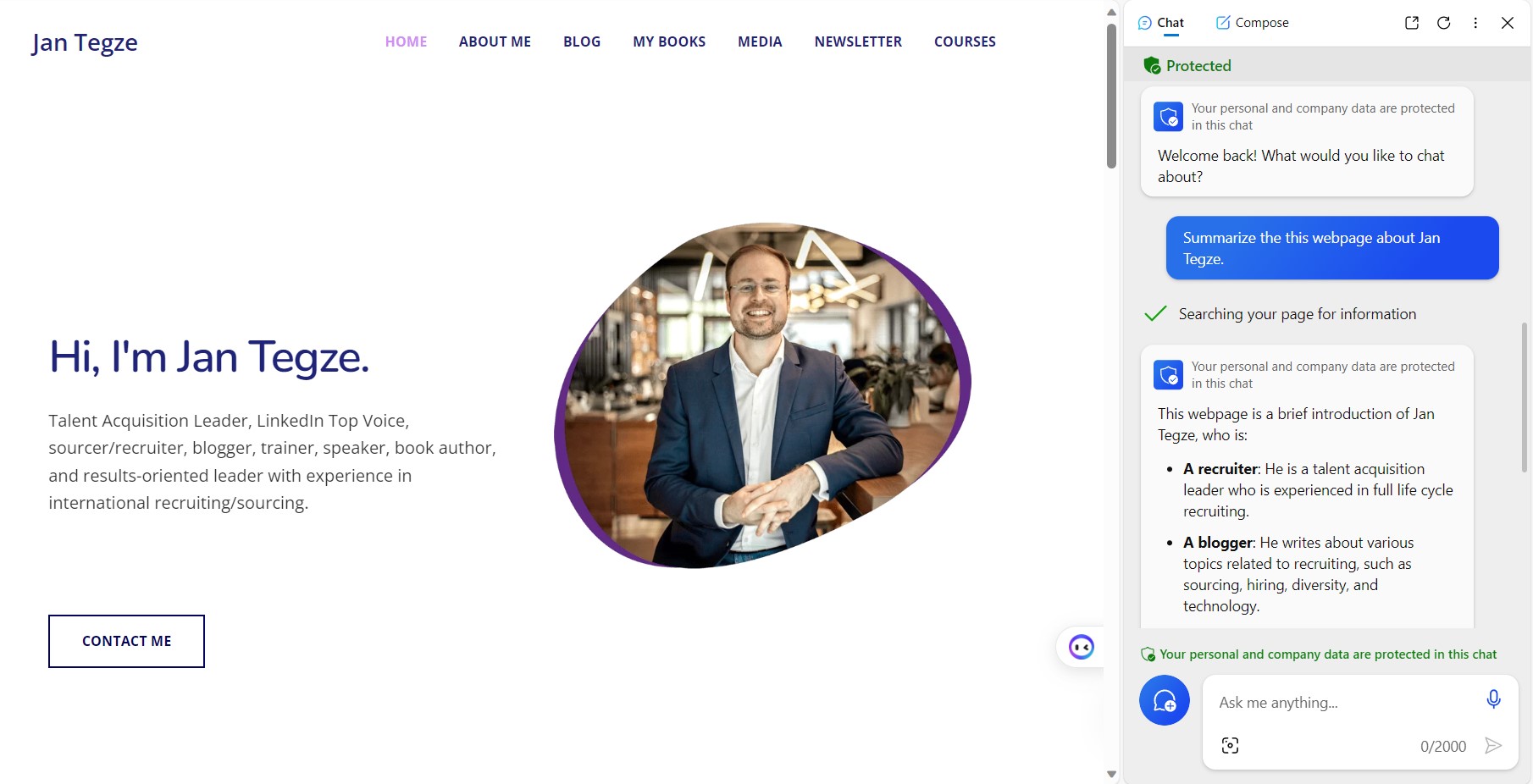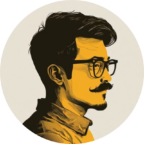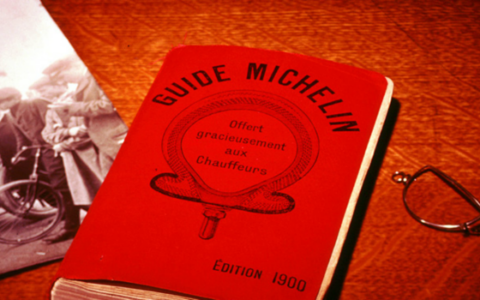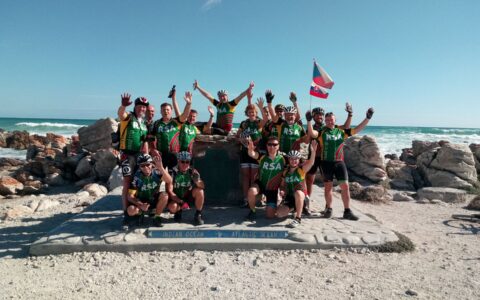Data, AI and the Human Touch: Jan Tegze on Adapting Recruitment to New Realities

Today, I'm catching up with Jan Tegze, a standout name in the world of talent acquisition and HR. We will dive deep into the real stuff – the challenges and wins that are really shaping how we manage talent today (yes, we talk about AI too). Get a sneak peek into the future of this field. Trust me, this is a conversation you'll definitely want to be a part of.
About Jan Tegze:
Jan Tegze is an acclaimed recruitment thought leader, LinkedIn Top Voice, author, and sought-after industry voice renowned for advancing the field of talent acquisition. With an influential career spanning over two decades, Jan serves as a principal voice steering the modern recruitment evolution. His bestselling books like Full Stack Recruiter and Job Search Guide synthesize his approach to high-velocity sourcing, data-driven hiring, and invaluable advice for job seekers. Jan's extensive expertise encompasses full-cycle recruiting, international recruitment, branding, and pioneering sourcing techniques. As a speaker, he's shared his insights at global conferences, covering a spectrum of topics from sourcing methods to analytics.
ANTONÍN: Jan, you've been recognized as a visionary in the realm of talent acquisition and HR. Tell me something about yourself.
JAN: I'm not sure if I'd agree with being called a visionary. I'm just a guy who fell in love with recruitment and sourcing many years ago, and I still enjoy it every day!
One thing I strongly believe in is that data-driven approaches and cutting-edge technology can totally transform how companies attract, hire, and retain talent.
I've dedicated a big part of my career to exploring strategies that leverage AI, machine learning, and predictive analytics (and anything else that improves the recruitment process).
I am also a huge advocate for candidate experience. I truly believe that how organizations engage with potential employees is just as important as the skills and experiences those candidates bring.
Creating a positive and inclusive candidate journey is absolutely crucial for any organization's success.

ANTONÍN: I can totally feel your love for recruitment and sourcing. Could you share what initially drew you to this field and what keeps your passion alive after all these years?
JAN: Many things that have happened in my life have been accidents.
I ended up working at a recruitment agency a few months before I was supposed to start my second college because I thought being a recruiter would provide an awesome experience and be an easy job since I could work with people. Boy, I was wrong!
The job turned out to be quite challenging, but it always presents new challenges and things to figure out. The challenges and the great team I work with keep my passion alive.
But you know what I really enjoy?
I love being able to share the knowledge I have gathered over the years through my books, articles, and newsletters. That part really brings me happiness because I believe that sharing is caring, and I can see how it has helped others.
"Data-driven approaches and cutting-edge technology can totally transform how companies attract, hire, and retain talent." Jan Tegze
ANTONÍN: You mentioned AI and cutting-edge technologies. I believe they currently represent a big challenge. People like you and me need to leverage these to do our jobs better and faster to stay ahead. From my own experience, it's an exhausting task. Do you feel the same way?
JAN: I always liked technology (even though it is connected with several negatives), because I believe it could help recruiters be more effective and the time they save on repetitive tasks could be used to spend more time with candidates.
Yes, I feel the same way that it is an exhausting task. Currently, AI tools represent a big challenge. Especially now AI is evolving so fast, it's very hard to keep up with all the news and updates.
The fear of missing out (FOMO) that we all experience often leads to burnout. That's why I choose not to hastily embrace every new thing I come across on LinkedIn, X, or Facebook. Instead, I prefer to let others test and potentially fail with these new things.
After a while, I review their findings and learn from their mistakes. This way, I can spend a few hours improving their methods, finding or creating my own ways, instead of spending days or weeks reinventing the wheel.
ANTONÍN: Could you share some effective strategies or findings from AI tools that you've successfully incorporated into your daily routine? For instance, I've used the Copilot in Edge to efficiently review your LinkedIn profile and website, gaining insights into your interests and expertise. Manual research would have taken me five times longer.

JAN: There are so many ways to discover AI tools!
Personally, I've found some great ones through LinkedIn, Facebook Groups, X, and AI newsletters I'm subscribed to. And even on Appsumo. Plus, I'm lucky enough to have companies reaching out to me for feedback or collaboration opportunities.
And let's not forget about my friends and other recruiters who are always sharing tips on new AI tools with me. It's all about staying connected and learning from each other!
Among the tools I use daily, there's ChatGPT, Anthropic, Jasper, Voila, and FlyMSG. But there are plenty more tools I'm testing or playing around with every month.
ANTONÍN: How have these AI tools transformed your approach to talent acquisition, and what significant changes have you observed in your results or efficiency?
JAN: I'm not entirely sure if I'd go as far as saying "transformed," but it definitely helped me become way more effective in what I do. My goal is to save around 24 hours every week for work and personal activities via AI tools. Right now, I've managed to save around 15 hours give or take.
The time I save at work on repetitive tasks allows me to spend more time with candidates, while outside of work, it gives me the opportunity to reply to those seeking advice on job searches or write articles that can assist hundreds of job seekers.
Even though these are things I do in my free time and outside of work, I still represent my company and colleagues. After all, we all contribute to building our company's brand through our actions even if we are not at work.
So, for me, it's not about doing more or being more efficient. But rather having more time for the people who matter to me and those who need help.

ANTONÍN: Based on your extensive experience in HR and talent acquisition, what major developments do you foresee in the near future for AI in this field? Specifically, do you envision the emergence of advanced technologies such as robot recruiters or similarly sophisticated AI systems?
JAN: Based on my observations of the HR/TA tech landscape, I definitely foresee artificial intelligence playing an increasingly prominent role in talent acquisition and management in the coming years.
Here are a few key developments I expect to see:
- Intelligent Screening: AI-powered tools will become more adept at reviewing resumes/profiles, conducting initial interviews, and evaluating candidates to generate a shortlist for human recruiters. This can significantly expedite early funnel activities.
- Chatbot Interactions: Chatbots and conversational AI will allow companies to engage candidates over messaging platforms at scale to screen, update on process status, schedule interviews, etc. Initial interactions will become highly automated before escalation to human recruiters.
- Analytics and Recommendations: Sophisticated analytics on past hiring data, employee performance, and attrition drivers will empower recruiters to make smarter decisions on the types of profiles to target. AI can also suggest suitable candidates to pursue.
That said, I don't foresee advanced AI replacing human judgment and emotional intelligence anytime soon when assessing cultural fit, soft skills, creativity, passion, etc.
Robot recruiters without empathy in hiring will likely undermine candidate experience and employer brand. Humans augmented by AI is the path forward. So there will be a balance between technology and the personal human touch. 2024 and beyond will see this hybrid model evolve further.
The key is to leverage AI ethically to remove drudgery where possible while preserving what makes us human. If done right, recruiters can focus on more strategic priorities and relationship-building with candidates and hiring managers.

ANTONÍN: Do you think there will come a time when AI not only complements but also significantly surpasses human capabilities in key areas of talent acquisition? That would lead us to rethink the fundamental role of human recruiters in the hiring process. Is something like this happening already?
JAN: I do believe AI has the potential to surpass human capabilities in certain recruiting activities. But not in the entirety of talent acquisition.
Here is my perspective:
AI is already demonstrating strengths in areas like resume screening, basic interviewing, test administration/scoring, analytics on past hiring data, and chatting at scale to engage candidates.
Advances like natural language processing, speech recognition, and emotional intelligence will only sharpen these capabilities.
But I don't foresee AI completely replacing the human judgment, empathy, creativity, and strategic perspective needed to evaluate cultural fit, adapt to nuances, assess soft skills, spot red flags, negotiate offers, etc. Machines currently lack the generalized intelligence to replicate these aspects.
So while AI will continue handling high-volume tasks more efficiently, strategy formation, consultative hiring manager interactions, candidate relationship building, and closing complex talent deals will likely stay more human-driven.
This implies a long-term future of hybrid teams: humans setting the vision and handling aspects requiring social/emotional intelligence, aided by AI tools that exponentially increase their bandwidth on other execution aspects.
In essence, both sides have irreducible strengths at this point, making the combination more powerful than either alone.
So rather than AI surpassing and replacing humans, I see collaborative intelligence being the end goal - combining the best of human and artificial capabilities for mutual benefit.
The key is proactively developing ethical frameworks to ensure AI deployment uplifts rather than diminishes human potential. Responsible adoption that keeps candidates’ best interests in mind will allow for constructive rather than disruptive change.
"I don't foresee AI completely replacing human judgment, empathy, creativity, and strategic perspective." Jan Tegze
ANTONÍN: Shifting gears a bit. I'm curious about the intersection of our roles. As a marketing manager, I often find myself in the realm of talent acquisition, especially when scouting for skilled authors and bloggers. Similarly, your approach to using LinkedIn for brand marketing is quite remarkable.
In light of this overlap, do you think that being a great recruiter requires skills akin to a great marketer, and vice versa?
JAN: You raise an excellent point. Having expertise in one area lends itself well to success in the other.
At their core, marketing, and recruiting are both about storytelling - conveying why a product, service, job, or company is compelling, differentiated, and worth one's time. They involve similar skills in positioning, persuasion, relationship-building, and strategic thinking.
Marketers have finely tuned audience insight to create targeted campaigns that resonate. Similarly, recruiters have strong candidate persona awareness to engage talent communities effectively. Understanding your buyer/candidate is crucial.
Both roles also rely heavily on metrics optimization and funnel analysis to improve important metrics over time, whether that's traffic, lead-gen, and sales, or applicant yield and hires. Leveraging data to refine strategies is key!
Additionally, expanding ambassadors and referral networks leads to sustained growth on both fronts. Smart marketers and recruiters nurture partnerships and advocates to widen their reach. Community building powers enduring impact.
Given these fundamentally equivalent capabilities powering excellence, I believe that some great marketers can become phenomenal recruiters and vice versa with some complementary skill-building. The underlying mental models translate beautifully across the domains.
"Marketing and recruiting are both about storytelling - conveying why a product, service, job, or company is compelling, differentiated, and worth one's time." Jan Tegze
ANTONÍN: Based on your insights about the overlap between marketing and recruiting, how do you see my transition from talent sourcing through auditing and content creation, to my current role in content marketing management? One recruiter said my career path was a mess. And now I want your opinion…
JAN: Let me ask you this, if you're applying for a Marketing/Copywriting role that requires, let's say, 3 years of experience, why should the sourcing or auditing job you did years ago even matter, right? I mean, sure, it's a great addition, but what really matters is if you have the right skills and knowledge for the job you're applying for.
I gotta applaud anyone who can transition between industries and jobs, 'cause let me tell you, it's not an easy job to do. That recruiter might say your career path is a mess, but I see it differently.
I see it as you being flexible, not afraid to change industries, and searching for something that brings you joy.

ANTONÍN: Reflecting on my career, I feel fortunate to have had the opportunity to develop my skills in communication (Talent Sourcer), analysis (Audit Assistant), and content creation (Copywriting) progressively. Each role has taught me something new. Now I find myself able to apply all these skills in a meaningful way. I am glad there are some recruiters who can see the bigger picture!
Jan, what guidance would you offer to people contemplating such shifts in their career path?
JAN: You raise a fair point - transitioning into a new industry can undoubtedly be very challenging without direct experience. Companies often look for candidates who check all the boxes, including having several years of background in that specific field.
However, all hope is not lost.
You can pursue strategic side projects (or build one), networking opportunities, and informational interviews to start building visibility and connections in your target industry. This allows the right people to recognize your broader potential cultural add, beyond just technical skills.
Also, identify transferable competencies from your background that could be valuable in the new role.
For example, analytical abilities honed through auditing may perfectly translate toward evaluating process optimization opportunities in a different context. Highlight these in your interviews and applications.
While it does require luck to find a flexible hiring manager willing to take a bet on unusual backgrounds, maintaining a proactive mindset on skill-building, self-educating, and relationship development can only help your cause.
"Companies often look for candidates who check all the boxes, including having several years of background in that specific field." Jan Tegze
ANTONÍN: I'm interested in delving into a more fundamental question now: In your view, what exactly means 'talent' in today's job market? How do you define talent, and what are the key attributes or skills that you believe make a candidate truly stand out overall?
JAN: That's an excellent question. The definition of "talent" in today's job market is evolving.
At its core, talent still encompasses both the hard and soft skills needed to excel in a role.
This includes technical abilities, knowledge, and results a candidate has demonstrated, alongside strengths like communication, critical thinking, leadership potential, and cultural contribution.
However, some non-traditional attributes are rising in importance to be considered:
- Growth Mindset - With careers spanning many pivots now, candidates who actively learn, upskill, and expand their thinking stand apart. Intellectual curiosity and humility enable continuous adaptation.
- EQ and Empathy - With remote work, digital-first customer service, etc, skills like relationship-building, conflict resolution, listening, and understanding context have become imperative.
- Resilience & Grit - The volatility of recent years has placed a premium on mental strength, grit, and bouncing back from adversity. Talent today must demonstrate poise under uncertainty.
- Creativity & Innovation - With AI threatening many transactional jobs, the need for human originality, purpose, and vision has heightened. The idea generators stand out.
So, technical skills open the door, but mindsets and meta-skills determine trajectory and impact! Organizations thus look beyond past experiences to assess one's agility for future disrupted realities. That determines genuine, lasting talent.

ANTONÍN: Jan, as we reach the conclusion of our conversation, I'd like to ask a more personal and reflective question. Looking back, what has been the most unexpected lesson you've learned about yourself, your profession, or the nature of talent itself?
JAN: I’d say the biggest personal realization has been just how much room there is for creativity within recruitment.
Early on (at the beginning of my career), I viewed hiring as quite analytical - almost transactional. Post the role, source candidates, interview, and close. The human touch was lacking.
But over time as I incorporated art alongside science - leveraging storytelling, design thinking, and even humor to engage talent - I was struck by how inventively one can reimagine processes.
I also underestimated the depth and nuance of sourcing quality candidates beyond skill matches. Evaluating cultural contribution, growth potential, and ingenuity revealed new dimensions to assess. Talent itself proved so multi-faceted.
And as I immersed myself in people analytics, I discovered connections between data points I never expected.
Predictive hiring algorithms uncovered astonishing interplays in team dynamics, performance drivers, and retention factors.
So throughout the exhilarating changes in this industry and my own personal growth journey, I’ve been humbled to never stop learning. To lean into curiosity every day and approach talent acquisition like a scientist and an artist - with logic but also wonder.
After all these years, the beginner’s mindset still feels revolutionary. And I’m grateful for these small surprises that keep recruitment endlessly exciting even today!











